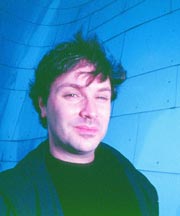HOW MUCH intellectual analysis can pop music withstand? And how much can you? Find out next weekend when EMP hosts its first Pop Music Studies Conference.
The two-day affair will bring together 100 panelists—mostly academic types, but also journalists and musicians—to present papers on such subjects as “Syntax and Semantics in the Blues,” “The Auteur Theory of Merle Haggard,” and “Popular Representations of the Independent Record Shop.” Overseeing the event is 36-year-old Eric Weisbard, a prolific rock critic for SPIN, The Village Voice, and other respected rags, who arrived here from New York just a few months ago to work at EMP, and whose brain, on its own, seems to harbor an entire conference’s worth of ideas, opinions, and inspiration about rock and roll.
“You shouldn’t have to apologize for being intelligent about pop music,” says Weisbard, ordering a suitably Northwesty microbrew at the Two Bells. “Pop music shouldn’t be a second-class citizen compared to the other arts. I want to make the case for pop music as a deep, rich subject, not shallow, ephemeral, homogeneous as some people want to make it. It’s depressing when people only ask, ‘Why isn’t there a new Bob Dylan?'” Engaging with pop music, he says, is like “watching all these stories unfold, a million different narratives that are open-ended. There are a million threads of culture that keep getting transformed.”
A Ph.D. dropout himself (he abandoned a history doctorate program at Berkeley), Weisbard is well suited for bridging the divide between dry theoretics, journalistic bombast, and misunderstood musicians—and that’s precisely what the conference may help achieve. In addition to scholars from universities all over the U.S. and U.K. (“There’s been an explosion of people doing academic work on pop music,” Weisbard says), the EMP event will convene a Northwest Musicians Panel, with Mark Arm (Mudhoney) and Carrie Brownstein (Sleater-Kinney), among others. And Olympia indie folksinger Sarah Dougher will address the question confronted by coffeehouse audiences everywhere: “She Sounds So Sad—Do You Think She Really Is?” For the conference’s keynote event on opening night, Simon Frith of Stirling University in Scotland will argue that the U.S. no longer sets the world’s musical agenda, while Robert Christgau of the Voice will assert that rock and roll has become the globe’s musica franca.
Originally conceived by EMP director Robert Santelli and American studies professor Daniel Cavicchi of the Rhode Island School of Design, the conference has been a year in the making. A call for papers went out last summer, and Weisbard was brought on to help organize—from assembling panelists to deciding whether fruit should be included in the guests’ free continental breakfast. The job represents quite a leap from what Weisbard says was “a very chambered existence” as a New York writer. After leaving the Voice, he spent three years as a freelancer, working out of a 14-foot-wide Brooklyn house, along with his wife, New York Times critic Ann Powers. She, too, took a job at EMP, as senior curator, and the couple arrived in December. “I wanted to find other ways to be intellectual about music [besides being a critic],” he says. “And I wanted to be part of a young place still shaping its identity. At SPIN and the Voice and The New York Times, things had been done well for a long time before you got there. That didn’t mean you couldn’t have an impact. But there’s a difference. . . . ” The one message Weisbard says he wants to get across to locals about the conference is, “This is not going to be boring; and you’re welcome.”
Of course, individual enjoyment may vary, depending on your tolerance for notions such as “the ambiguous valence of the term ‘post-rock,'” “ethnographic research culled from my dissertation fieldwork in independent record shops,” and “signification and affect” in the Carpenters’ song “Superstar.” As Weisbard observes, “Seattle is a book town, and it’s a music town. But I’m not sure if it’s a town for people who are bookish about music. On that level, this is an experiment.”








